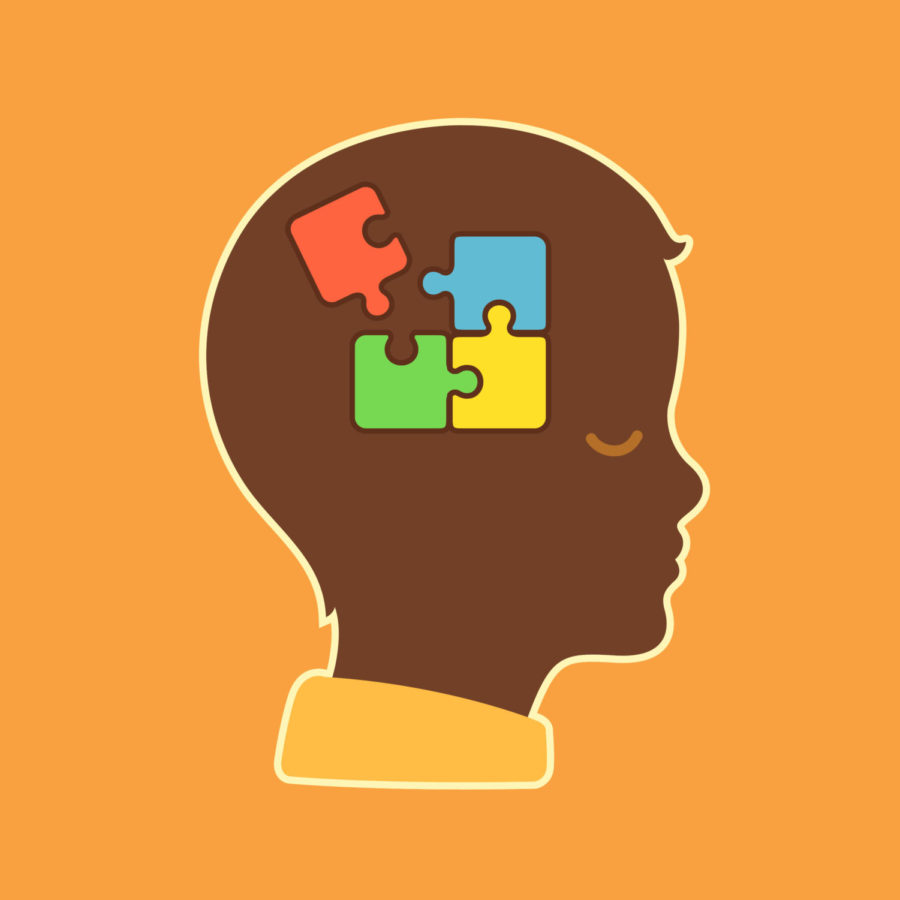Beiwel: Disrespect in Autism Speaks undermines movement
child head profile silhouette with jigsaw puzzle symbolizing autism spectrum disorders
October 19, 2015
Autism is one of the most stigmatized, underrepresented and least understood disorders in medicine. While 1 in 68 children will be diagnosed with an autism spectrum disorder this year, it is still largely misconstrued as something that happens to the fictitious “other” — your friend’s child, your coworker’s nephew or that man at the grocery store.
The singular and limiting conception of normalcy has created a stigma around autism and other mental disorders that is both damaging and misrepresentative. This misrepresentation has filtered into the media and created a stereotypical version of the autistic person, as evidenced by the depiction of Virginia Dixon, an autistic doctor on the popular medical-drama show “Grey’s Anatomy.” Many people found her emotionless and sterile demeanor insulting and stereotypical. The character added nothing new to the conversation about autism and further cemented old, damaging clichés.
Part of the stigma surrounding autism stems from our lack of knowledge about what causes it and how it can be effectively treated. As autism affects many factors of peoples’ lives, particularly the way they communicate with and relate to those around them, they can have issues with language, signals and feelings.
This, understandably, can lead to a communication barrier and a strain in relationships that places the autistic person as one who should be “dealt with” rather than understood and treated like a person.
Nowhere is this more clear than in Ongoing Traumatic Relationship Syndrome, colloquially known as the Cassandra Phenomenon, named for a prophetess in Greek mythology. Simply put, it’s the trauma experienced by those close to people with autism who do not have it themselves. These people are known as neurotypical people. Those affected can be romantic partners or family members who endure “psychological harm” at the hands of their relative or partner who has autism.
I understand that it can be difficult to live with someone who has difficulty communicating with you and cannot express to you what their needs are.
But I take offense at a line from Families of Adults Affected by Asperger’s Syndrome — “We are isolated, no one validates us, we lose friends and family and we feel like ‘hostages’ in our own homes.”
I would never try to undermine someone’s own problems or experiences, but this is a sweeping statement that not only assumes an autistic person is solely responsible but that every neurotypical person who chooses to be with someone who has autism will be put through hell, with no exceptions. This type of demonization is common and sad, as autism can be both accurately represented and misunderstood at the same time.
This is not to say that autistic people have no advocates. Surely Autism Speaks, the world’s “leading autism science and advocacy organization” is a clear voice among the large number of oppressors and misinformation surrounding autism? It must treat people with autism with their deserved respect and seek to support them both on the large and small scale.
Sadly, no.
First, I believe that Autism Speaks does good, abundantly so. It sponsors charity events and attempts to spread as much information as it can.
But, it is misinformed on some issues and spreads that misinformation on a wide-scale basis. In the past, it has supported the inaccurate belief that vaccines are linked to autism, and the wording on its website is still indecisive. It also has displayed a penchant toward fear mongering, which is evident in its “10 Years of Progress” piece that was released at the beginning of this year.
It cites that the number of autistic children has been rising, stating that it has gone up “more than 100 percent in a decade.” However, this is easily attributable to the fact that doctors can more easily diagnose autism. An Autism Speaks study that claims to have found a large number of autistic students in South Korea used parent reporting as surveys who report behavior rather than actual diagnostics for all of the children.
Perhaps more worryingly, many people claim that Autism Speaks isn’t speaking for the autistic people as much as it is for those around autistic people. Autism Speaks claims to be an advocate for people with autism while simultaneously using fear tactics to ostracize them. It seems to consider nonverbal autistic people to be substandard.
Many autistic people resent this, saying all types of communication are valid and that attempts to make them speak can seem dehumanizing and intrusive.
This dehumanization is rampant. In one example, the vice president of Autism Speaks talked about considering driving off a bridge and killing herself and her autistic daughter instead of raising her.
While it has been stated that this was taken out of context, some were still enraged by the insensitivity and the claim that autistic people are better off dead. The fact that the single autistic board member resigned, stating insensitivity and destructive messages, is telling for many reasons.
One of the largest issues appears to be the emphasis Autism Speaks places on a cure. I mean no disrespect — I understand this. Autism can be debilitating and tragic, particularly in low-functioning individuals. I understand and support the desire to alleviate that. However, I also understand the multiple claims that the desire for a cure undermines their existence. The term neurodiversity is said often and refers, in this case, to the belief that autism is a “normal, natural variation in the human genome.” A cure is the implication that those affected by autism are diseased.
Again, I understand Autism Speaks, and other outlets trying to address Autism, do it from a positive place. But oftentimes when people seek to speak for people with disabilities or people who have been discriminated against, they speak over them. I believe Autism Speaks can do better, it just needs to listen when others are speaking.







